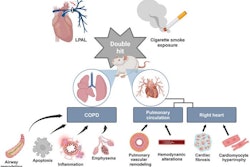
Women are around 50% more likely than men to develop COPD, even if they have never smoked or smoked less than their male counterparts. That’s according to a recent study, “Gender, Tobacco and Chronic Obstructive Pulmonary Disease: Analysis of the 2020 National Health Interview Survey,” published in BMJ Open Respiratory Research.
The researchers said in a news release that smoking is one of the main causes of COPD, but despite a decrease in cigarette smoking over the past 50 years, COPD remains one of the leading causes of death in the United States. In addition, the prevalence among women is approaching that of men.
Women with COPD tend to have more severe symptoms at a younger age than men. This had led to the conventional wisdom that the explanation may lie in a heightened susceptibility to the effects of cigarette smoke. To investigate this more closely, the researchers drew on information from the 2020 National Health Interview Survey.
The respondents included 12,638 women and 10,390 men all aged at least 40. They were asked about their smoking history, what tobacco products they used and whether they vaped. Women reported lower rates of both former and current cigarette, cigar and pipe smoking — as well as lower smokeless tobacco use — compared to men.
Within the same groups, the prevalence of COPD was less than 8% for women and 6.5% for men. Women with COPD were more likely to have never smoked cigarettes (26.5% for women compared to 14% for men). They were also less likely to use other tobacco products except for e-cigarettes. Women smokers reported fewer daily cigarettes than men and were less likely than men to have started smoking before the age of 15.
Despite these differences, the prevalence of COPD was higher among women who had smoked than it was among men (16% compared to 11.5%). And among those who had never smoked, it was almost twice as high among women (3%) compared to men (1.5%).
The researchers acknowledged that the study relied on self-reporting rather than objectively measured data and was missing potentially important information like hormonal influences, family history and other exposures. However, they said the results are still worth noting.
“These finding should raise questions about whether differing susceptibility to tobacco smoke is the key factor driving the increased COPD prevalence in women in the U.S.,” they wrote. “Our findings refine prior estimates of COPD among those without a smoking history and re-emphasize the high burden of COPD in women, underscoring the need for thoughtful efforts to prevent, diagnose and treat the disease.”






















